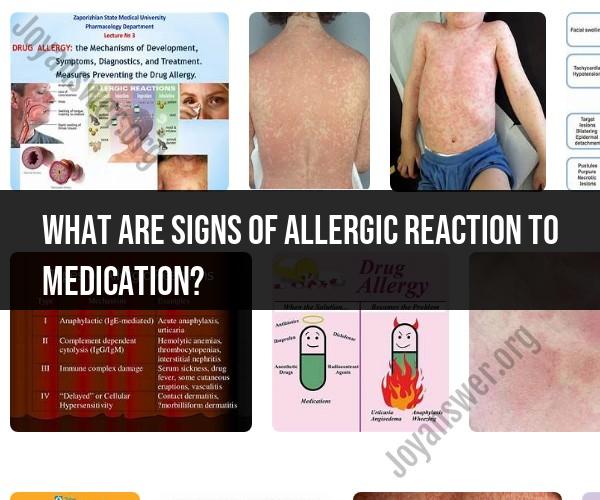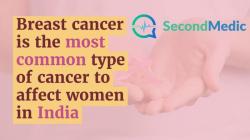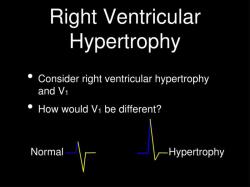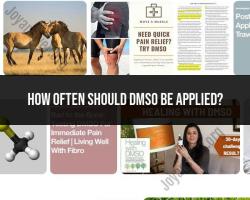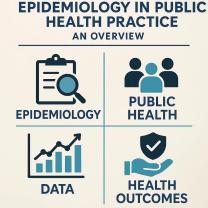What are signs of allergic reaction to medication?
An allergic reaction to medication can range from mild to severe and may manifest in various ways. If you suspect that you or someone you know is experiencing an allergic reaction to medication, it's essential to seek medical attention promptly. Here are some key indicators and signs of a medication allergy:
Skin Reactions:
- Rash: A rash is a common allergic reaction symptom. It may appear as hives (red, itchy welts) or a widespread rash on the body.
- Itching: Pruritus, or intense itching of the skin, can occur with an allergic reaction.
- Eczema: Allergic contact dermatitis can lead to eczema-like symptoms, with redness, swelling, and peeling of the skin.
Swelling:
- Swelling of the face, lips, tongue, or throat is a concerning sign. It can lead to difficulty breathing, speaking, or swallowing.
Respiratory Symptoms:
- Shortness of breath
- Wheezing
- Coughing
- Chest tightness
Gastrointestinal Symptoms:
- Nausea and vomiting
- Diarrhea
- Abdominal pain
Anaphylaxis:
- Anaphylaxis is a severe and potentially life-threatening allergic reaction that can occur rapidly. Symptoms include a combination of the following:
- Difficulty breathing or wheezing
- Swelling of the face, lips, tongue, or throat
- Rapid or weak pulse
- Dizziness or fainting
- Loss of consciousness
- Severe hives
- Confusion or altered mental state
- Anaphylaxis is a severe and potentially life-threatening allergic reaction that can occur rapidly. Symptoms include a combination of the following:
Fever and Joint Pain:
- In some cases, an allergic reaction to medication can cause fever and joint pain, which can mimic other illnesses.
It's important to note that some adverse drug reactions may not be due to allergies but rather intolerance or side effects. True allergies involve the immune system's response to a medication. If you suspect a medication allergy, it's crucial to stop taking the medication immediately and seek medical attention. Allergic reactions can be diagnosed and treated by healthcare professionals, and they may recommend alternative medications or treatments if necessary.
Additionally, it's essential to communicate any known drug allergies or previous adverse reactions to medications to your healthcare provider to minimize the risk of allergic reactions when new medications are prescribed.
Recognizing Allergic Reactions to Medications: Key Warning Signs
Drug allergies can range from mild to severe, and some can be life-threatening. It's important to know the key warning signs of an allergic reaction so that you can seek medical attention immediately if you experience them.
Here are some of the most common warning signs of a drug allergy:
- Skin reactions: Hives, rash, itching, swelling of the lips, tongue, or face
- Breathing problems: Wheezing, shortness of breath, difficulty swallowing
- Anaphylaxis: A severe, life-threatening reaction that can cause multiple organ systems to fail. Symptoms of anaphylaxis include:
- Hives or swelling of the lips, tongue, or face
- Difficulty breathing or wheezing
- Dizziness or lightheadedness
- Rapid pulse
- Drop in blood pressure
- Loss of consciousness
If you experience any of these warning signs after taking a medication, it's important to seek medical attention immediately. Even if your symptoms are mild, it's important to get checked out to make sure they don't worsen.
Allergic Reaction to Medicine: Symptoms and Red Flags
In addition to the key warning signs listed above, there are a number of other symptoms that can occur with a drug allergy. These symptoms can vary depending on the medication and the severity of the reaction.
Here are some other possible symptoms of a drug allergy:
- Digestive problems: Nausea, vomiting, diarrhea, abdominal cramping
- Fever
- Headache
- Muscle aches
- Joint pain
- Low blood pressure
- Anaphylaxis
If you experience any of these symptoms after taking a medication, it's important to talk to your doctor. They can help you determine if you're having an allergic reaction and recommend the best course of treatment.
Navigating Medication Allergies: What to Watch for
If you have a known drug allergy, it's important to be extra careful when taking any new medications. Be sure to tell your doctor about all of the medications you're taking, including over-the-counter medications, herbal supplements, and vitamins.
It's also important to read the labels of all medications carefully to make sure you're not taking anything that you're allergic to. If you're not sure whether or not a medication is safe for you, ask your doctor or pharmacist.
Here are some other tips for navigating medication allergies:
- Keep a list of all of your allergies with you at all times.
- Wear a medical alert bracelet or necklace that lists your allergies.
- Be sure to tell your doctor about your allergies before any medical procedure, including surgery or dental work.
- Have an epinephrine auto-injector (such as an EpiPen) on hand if you have a history of severe allergic reactions.
If you think you may be having an allergic reaction to a medication, stop taking the medication immediately and seek medical attention.
